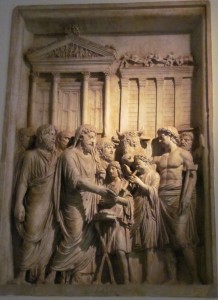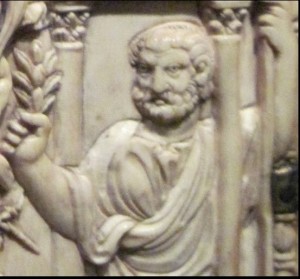Betrayal – personal, professional and political – is the theme of PERFIDITAS. How does betrayal change the individual? What are the underlying values of Roma Nova that Carina fears to betray? Some thoughts…
Betrayal, treachery, treason, deceit, perfidy – all names for the calculated violation of trust.
Trust is something we build up gradually, firstly, in our parents and carers, then teachers, friends, mentors, colleagues, in lovers and partners, in a organisation, an ideal, a country. We also build trust in ourselves, not just confidence or self-esteem, but the expectation we will do the right thing, whatever that is. Sadly, this trust is often broken. Sometimes, it’s a mis-spoken word, a leaked secret, emotional or physical involvement with another, unjust dismissal, abuse, being led into a harsh place under false pretences or dropped into a pile of trouble and deserted.
The effect of betrayal
We are wounded, cut to the bone, violated, crushed. People describe a shutter falling, a machete swinging through the air, a massive rift opening as in an earthquake. Shock, disbelief, despair, anger and a deep desire for revenge follow. Sometimes, we are engulfed by the feeling that we somehow deserved it and that we are an ‘unworthy’ person. If we get through those emotions, then we withdraw, a little more cynical and bitter at the world.
Personally, I try really hard to pull in the logical part of my mind to analyse the reason for this betrayal. I think that if I can work out why it’s happened I might be able to understand and prevent it happening in other circumstances. But the wound never really heals…
We have a huge aversion to being hurt and will strive to avoid it at all costs – this is our animal nature. But it’s also our emotional and intellectual nature. I grew up at the time of the Philby, Burgess and MacLean spy scandals. The last two had defected in 1951, but Philby didn’t flee until 1963 and the media brought up Burgess and Maclean names again. And George Blake, another double agent, escaped from Wormwood Scrubs prison in 1966. All terribly shocking to a young middle class girl brought up on heroic war films (Carve Her Name With Pride, In Which We Serve, Millions Like Us), and in a family which had served their country and had strong principles of justice and doing the right thing.
But we all mature with age and now I take a more nuanced view. Sometimes we are forced to betray, and the strength of character required to resist it belongs to heroines and heroes. I do wonder if we’d all be strong-minded and principled enough to keep faith if we’d lived under Nazi or Stalinist regimes or if somebody was holding a gun at the head of our family?
When I thought about the second Roma Nova book, I knew I wanted to look at the theme of betrayal. In PERFIDITAS, political, professional and personal betrayal are all mixed together – it makes a better story – but the characters feel and express the same devastation.
The tough historical background
In ancient Rome, virtue, trust, honour, civic duty were highly valued. The old cliché of falling on your sword if you’d committed a wrong was no cliché; political suicide (whether ‘encouraged’ or genuine) was frequent. Service to the state was considered to be the norm especially in the Republican period.
The mos maiorum (ancestral custom) was the unwritten core code from which the ancient Romans derived their social norms. It included time-honoured principles, behavioural models and social practices for private, political and military life.
• Fides: trust/trustworthiness, faithfulness, reliability, credibility – a significant concept in Roman law, as oral contracts were common.
• Pietas: dutiful respect towards the gods, homeland, parents and family
• Religio and Cultus: religio is the bond between gods and mortals, as carried out in traditional religious practices and cultus was the active observance and correct performance of rituals
• Disciplina: as related to education, training, discipline and self-control
• Gravitas: dignity, responsibility and earnestness
• Constantia: steadiness or perseverance particularly in the face of adversity
• Virtus: derived from the Latin word vir (man), virtus constituted the ideal of the true Roman male – valour, courage, and manliness – particularly in the public sphere
• Dignitas: reputation for worth, honour and esteem earned through displaying the other virtues
• Auctoritas earned prestige, social standing and respect
The Romans developed a strongly centralized sense of identity while adapting to changing circumstances. However, the mos maiorum depended on consensus and moderation among the ruling elite, whose competition for power and status threatened it as did the emergence of democratic plebeian politics.
Following the collapse of the Republic after the death of Julius Caesar, Augustus disguised his radical program under an outward show of respect for the mos maiorum. During the transition to the Christian empire, traditional Romans like Symmachus argued that Rome’s continued prosperity and stability depended on preserving the mos maiorum, while many early Christians dismissed it as “the superstition of old grandpas” (superstitio veterum avorum) and inferior to their new religion.
Today, Roma Novans’ core values are close to the principles of mos maiorum but have evolved over the centuries. Although the political structure has become democratic by the 21st century, the central set of values has persisted. Betrayal or ‘perfiditas‘ is not only abhorrent to them, but it breaks with all their blood and bone instincts. And in the third Carina Mitela adventure in the Roma Nova series, it’s all around them…
More about PERFIDITAS and how it nearly broke Roma Nova…
Alison Morton is the author of Roma Nova thrillers – INCEPTIO, PERFIDITAS, SUCCESSIO, AURELIA, INSURRECTIO and RETALIO. CARINA, a novella, and ROMA NOVA EXTRA, a collection of short stories, are now available. Audiobooks are available for four of the series. NEXUS, an Aurelia Mitela novella, is now out.
Download ‘Welcome to Roma Nova’, a FREE eBook, as a thank you gift when you sign up to Alison’s monthly email newsletter. You’ll also be first to know about Roma Nova news and book progress before everybody else, and take part in giveaways.

















